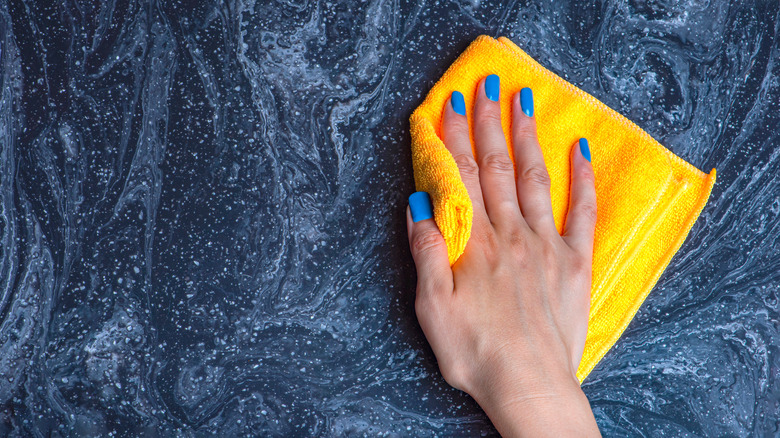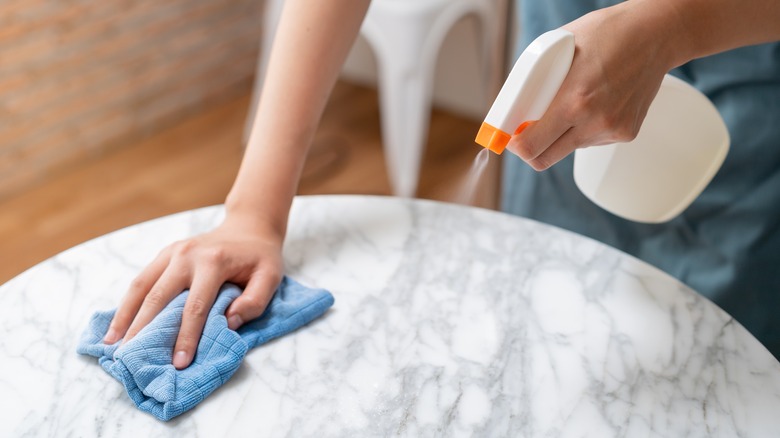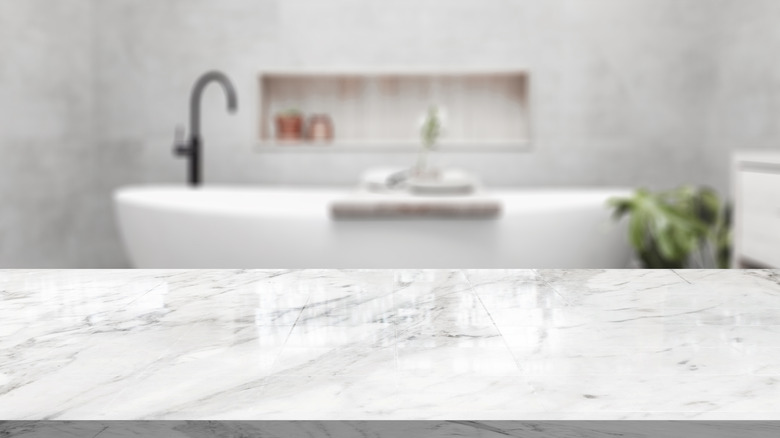Why You Should Think Twice Before Using Bleach To Clean Marble And Granite Countertops
When disinfecting areas of your home, you may tend to reach for bleach the most. It's an excellent surface sterilizer, after all. Not only that, it prevents members of your family — especially the school-aged youngsters — from spreading nasty germs and diseases (via The Centers for Disease Control and Prevention). So it's no wonder why many think that a good ol' bottle of bleach will do the trick in cleaning every room in the house.
But according to The Washington Post, you may be surprised to know that bleach isn't even a cleaner at all. It's a disinfectant! Still, many people reach for it when deep cleaning germy surfaces in their homes, as it is a very effective bacteria killer.
But before you get heavy-handed and spray the entire kitchen and bathroom with your DIY bleach and water solution, you may want to pause if your countertops are marble or granite. Turns out, those tough surfaces may not be as indestructible as they look. Here's why you should think twice before using bleach on them.
Bleach can damage and discolor marble and granite surfaces
Natural stone surfaces like marble and granite are susceptible to damage when using acidic and alkaline-heavy products (via Clorox). When bleach — a harsh alkaline solution — is applied to these surfaces, it can cause irreversible staining and discoloration, as well as physical damage like etching and fissures. You may think using a cleaner with a small amount of bleach would be okay, but think twice! According to The Granite Place, even diluted bleach products can cause your countertops to appear duller.
Instead, look for gentler cleaning products like mild dish soap. Bob Vila recommends looking at the ingredients on the packaging for any stone-damaging acidic ingredients. Refrain from using any "all-surface" cleaners unless the bottle states that it is safe for natural countertops. Although there are plenty of DIY disinfectants that use lemon and vinegar, steer clear of those products, too, as they are acidic and harmful to natural stone countertops.
The bottom line: mild dish soap and warm water are usually all you need to keep your granite and marble sparkly clean.
Other dos and don'ts of cleaning natural stone countertops
Unfortunately, it's not difficult to stain granite and marble, especially when it comes to acidic-heavy drinks like coffee and wine (via Bob Vila). You want to be extra careful when handling said drinks and spring into action immediately when spills occur. You may also benefit from using coasters to prevent any glass ring staining. Most of the stains associated with acid will etch the surface, which is, unfortunately, irreversible (via Marble and Granite, Inc.).
Granite and marble countertops are also popular in bathrooms, but certain hygiene products that contain oil, like lotions and creams, may stain the surface. The New York Times recommends lifting oil-based stains with a thick paste consisting of baking soda and a soft soap detergent. Leave this on overnight or for a few days for best results, washing it away with warm water. It may seem like there are several rules for adequately maintaining your natural countertops, but as long as you use gentle cleaners and are mindful of acidic spills, your granite and marble surfaces will continue to look brand new!


